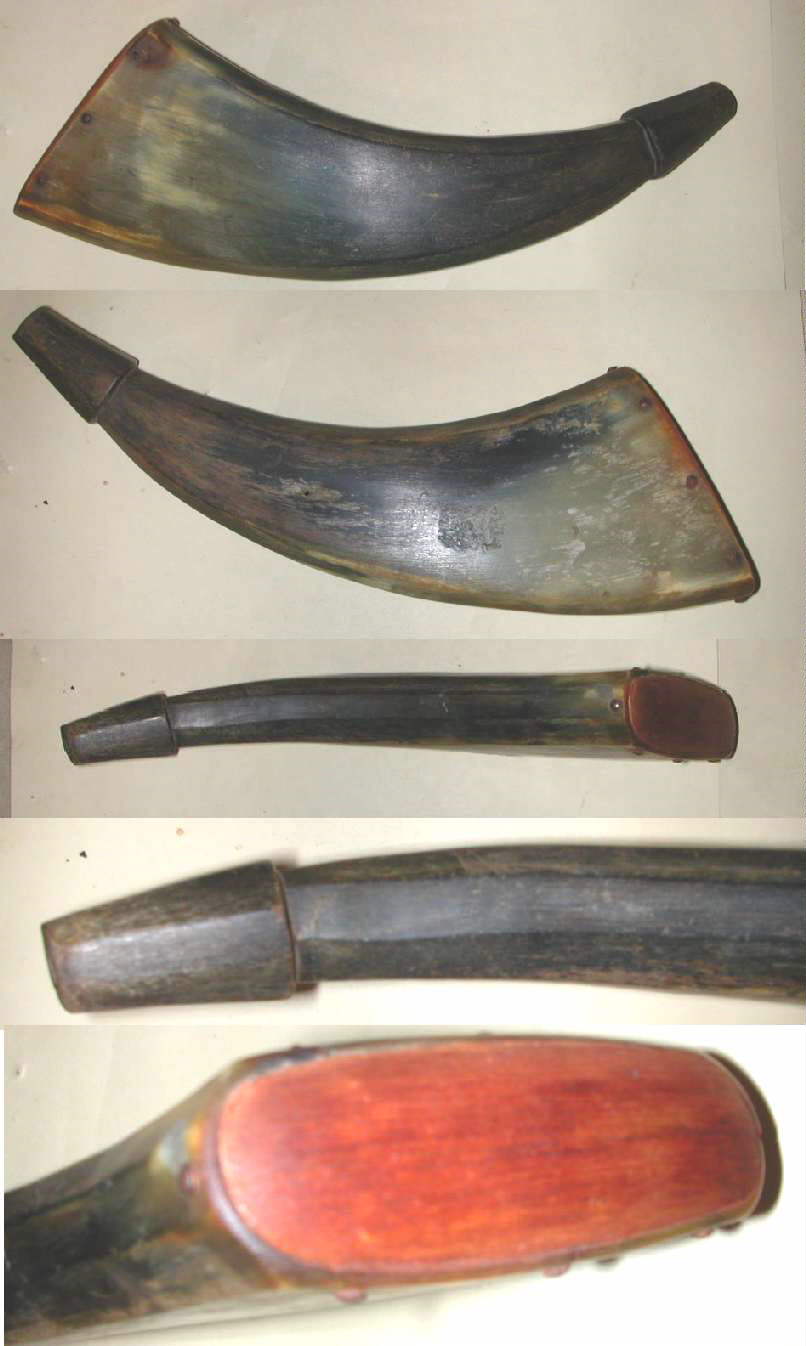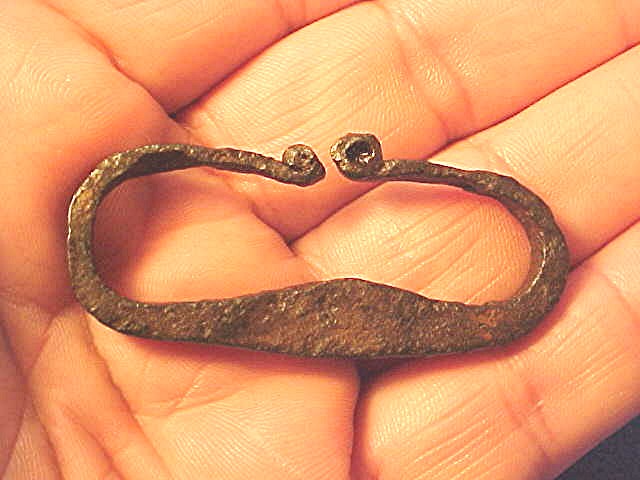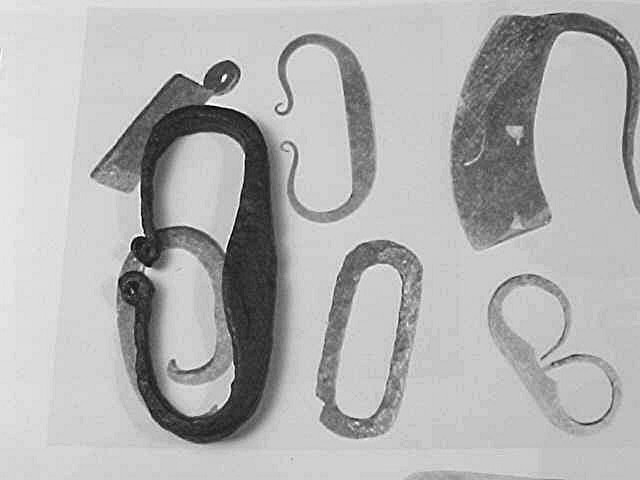_________________
_________________
_________________
_________________
Related links of interest of our family and its activities.
_________________
___________________
The Conner Collection.
Treasures from the French and Indian Wars to the American Westward Movement, gifts, found, traded for or purchased.
Shown are just a few items that came from this collection and have been offered for sale or trade over the years. The family has asked that a few items be displayed, to answer questions of what happened to this well known collection now belonging to others. The remaining pieces are being prepared for a "loan program" to travel different museums across North America.
* * * * * * * * *
Accoutrements

This has been an ongoing subject as to what one carries in the equipage.
Shown below are a few items collected from different sources dating from the F&I War into the late 1850's (still considered part of the North American Fur Trade).

|
Flattened cow horn containers used for salt, pepper, mixed seasonings or fine powder are fairly easy to find at sales. We have many of these over the years with a variety of woods used for the base plug with attachments ranging from iron or brass tacks to wood dowels. Prices will differ on these horns from one region to another, who and where it came from, etc. Be aware of new made and antiqued to look old, use a light to look inside for anything modern in the construction. |
* * * * * * * * *
|
Strikers are always of great interest, with discussions about the material, shape and thickness. Many different ideas as to which is older in design and mentioned variables.
|
Shown on the left is one of my favorites, small, thin and easy to carry. This striker came from a British camp site in upper New York. At this French & Indian War site we found many small items left from an earlier time. When going on private property always get permission before removing anything and shown the owners what you have found. |
* * * * * * * * *
|
|
These ball and shot
bags show different ideas in keeping ones items together. Note the double
bags used for combinations of either ball and shot or two different size
balls. Home tanned and commercial tanned seem to the norm. But then
look at the pillow ticking bag, interesting. |
* * * * * * * * *
|
If possible you should record anything know about the owner, last owner and where he got the item from, etc. This is a good selection of old ball and shot bags. The age on these range from as early as 1720's to as late as 1880. The three shot bags on the right all use commercially made nozzles with hand sewn leather bags. Note all three bags have commercial tanned leathers, home tanned is not uncommon either. |
|
* * * * * * * * *
|
|
You will be surprised at the value of items like shown on the left. Bullet boards are always high as are powder measures. While cased sharpening stones and some iron ware are not as lucky. One never knows what to bid on such items as shown and care really needs to be used when talking to a seasoned dealer. |
* * * * * * * * *
|
Here's a nice collection of handmade chain with vent hole picks and pan brushes all handmade from available materials. With these tools attached one could care for his flintlock while at camp or in the field. Again be aware of fakes, these can be easily reproduced and aged, then passed on as originals. |
|
* * * * * * * * *
|
|
Here are some examples of small kegs that measure 2 to 2-5/8 inches in height and 1 inch in diameter. They were used as salt horns judging from their contents, one had pieces of long grain rice to help keep the salt dry. |
* * * * * * * * *
|
A nice collection of original powder measurers made from animal horns and a few from copper and brass. There are several good reference books on this subject that will help you when looking at such items for sale. |
|
* * * * * * * * *
|
|
Here's another grouping powder measurers, period chain, a bullet board and an unusual powder, ball container of the 1850's. A collection of such items can become grow into a thing of beauty if displayed correctly. Most gun show organizers look for such displays to draw in the crowds, you would be surprised what we have been paid to show some of my Dad's collections. |
* * * * * * * * *
|
More shaving items; hair shaving brushes, mirrors, razor boxes, soap containers and cups, some unusual. |
|
* * * * * * * * *
|
|
Here are some examples of small kegs, a few powder horns, and a few flasks made from different materials. All of these are being reproduced today, caution should be used. All of these are originals, the brass flask was cleaned, thus hurting its value. |
* * * * * * * * *
|
Shaving boxes are special to collectors, material construction varies as does the method of construction. Usually found without the razor or with a replacement reproduction razor. The covers vary in folk art like the one on the left that's very fancy to the simple one on the right, painted surfaces are very common. |
|
* * * * * * * * *
|
|
Here's an example of a fancy rum horn (this is a reproduction that has been aged), again be aware of what your bidding on. Ask the seller questions, if not satisfied back off on the sale. |
* * * * * * * * *
|
Another grouping of shaving items needed to keep up ones appearance. Note the small brass writing case under the mirror, this is an original but there are several very good copies being made today that could be antiqued and sold as this one - original at four to five times the value of the reproduction. |
|
* * * * * * * * *
|
This is an original embossed copper powder flask of the type shown in "The Powder Flask Book" as a "Peace Flask" 1851. This is in the chapter on military powder flasks and the text discusses the variations. Bannerman offered these in his catalog of 1927 for $2.50 and again in 1955 for $12.75. This example is marked "James Dixon & Sons Sheffield" and conforms to the pattern of the others. It differs in motif slightly from the other examples, in that it has the slightly smaller US shield (which is more desirable to the collector). All of them have the stars and hands shaking shown, made for American use. Condition is as shown with the mechanism tight and functional. |
|
|
* |
_________________ NOTE Items shown on the "Conner Collection" pages have been SOLD and have been transferred to museum and personal collections across N. America. _________________ |















